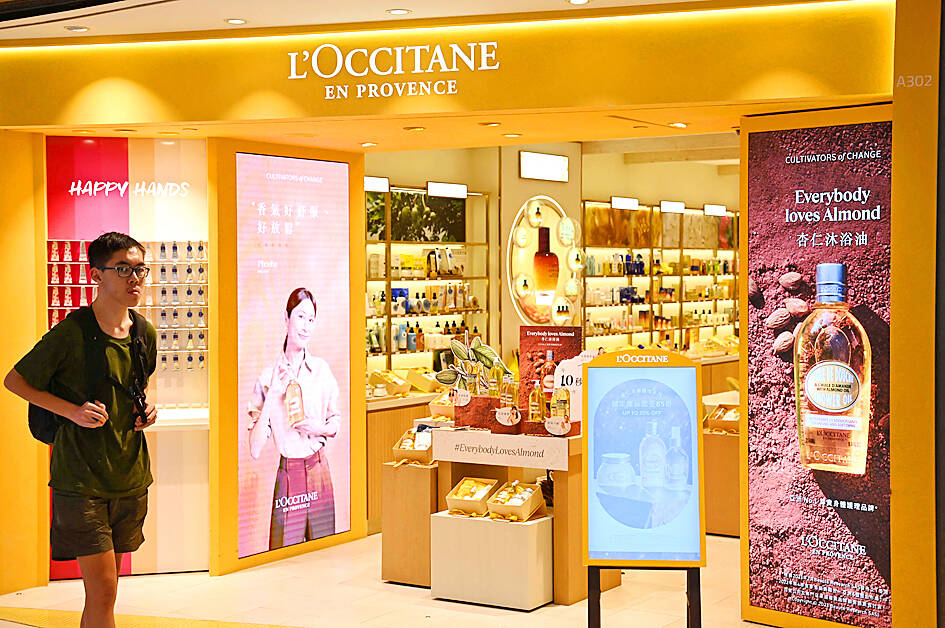Trading in French beauty brand L’Occitane was halted in Hong Kong after reports emerged that its controlling shareholder might turn the company private.
The luxury retailer, known for its skincare products and fragrances, raised more than US$700 million in its Hong Kong initial public offering in 2010, buoyed by optimism over the booming Chinese consumer market.
Bloomberg News said in July that L’Occitane International SA chairman Reinold Geiger was looking into the possibility of taking the company private, including discussions for a potential take-private offer of as much as HK$35 per share.

PHOTO: AFP
Geiger ultimately controls L’Occitane, owning more than 70 percent of the company, and has been speaking to advisers about the possibility of relisting the firm on a European exchange as soon as next year, Bloomberg News said.
L’Occitane announced yesterday that its Hong Kong-listed stocks would be suspended “pending the publication of an announcement pursuant to the Code on Takeovers and Mergers” an exchange filing showed.
The firm, headquartered in Luxembourg and Geneva, Switzerland, said last month it was considering a possible take-private deal with an offer price of no less than HK$26 per share, but “has not received any firm offer” at the time.
It closed at HK$27.80 on Thursday last week, with the market halting trading the following day due to a typhoon.
L’Occitane’s stock price was flat for the first half of the year before spiking about 40 percent in late July.
The brand’s listing in Hong Kong came at a time when Western brands were seeking new ways to tap the growing Chinese consumer market.
Taking the company private would add to a series of similar deals in Hong Kong as valuations remain depressed. Chinese snack maker Dali Foods Group Co (達利食品) received a take-private proposal from its controlling shareholder in June, and big-screen cinema company Imax Corp is also seeking to take full control of its listed Chinese business.

When an apartment comes up for rent in Germany’s big cities, hundreds of prospective tenants often queue down the street to view it, but the acute shortage of affordable housing is getting scant attention ahead of today’s snap general election. “Housing is one of the main problems for people, but nobody talks about it, nobody takes it seriously,” said Andreas Ibel, president of Build Europe, an association representing housing developers. Migration and the sluggish economy top the list of voters’ concerns, but analysts say housing policy fails to break through as returns on investment take time to register, making the

EARLY TALKS: Measures under consideration include convincing allies to match US curbs, further restricting exports of AI chips or GPUs, and blocking Chinese investments US President Donald Trump’s administration is sketching out tougher versions of US semiconductor curbs and pressuring key allies to escalate their restrictions on China’s chip industry, an early indication the new US president plans to expand efforts that began under former US president Joe Biden to limit Beijing’s technological prowess. Trump officials recently met with their Japanese and Dutch counterparts about restricting Tokyo Electron Ltd and ASML Holding NV engineers from maintaining semiconductor gear in China, people familiar with the matter said. The aim, which was also a priority for Biden, is to see key allies match China curbs the US

NOT TO WORRY: Some people are concerned funds might continue moving out of the country, but the central bank said financial account outflows are not unusual in Taiwan Taiwan’s outbound investments hit a new high last year due to investments made by contract chipmaker Taiwan Semiconductor Manufacturing Co (TSMC, 台積電) and other major manufacturers to boost global expansion, the central bank said on Thursday. The net increase in outbound investments last year reached a record US$21.05 billion, while the net increase in outbound investments by Taiwanese residents reached a record US$31.98 billion, central bank data showed. Chen Fei-wen (陳斐紋), deputy director of the central bank’s Department of Economic Research, said the increase was largely due to TSMC’s efforts to expand production in the US and Japan. Investments by Vanguard International

STRUGGLING TO SURVIVE: The group is proposing a consortium of investors, with Tesla as the largest backer, and possibly a minority investment by Hon Hai Precision Nissan Motor Co shares jumped after the Financial Times reported that a high-level Japanese group has drawn up plans to seek investment from Elon Musk’s Tesla Inc to aid the struggling automaker. The group believes the electric vehicle (EV) maker is interested in acquiring Nissan’s plants in the US, the newspaper reported, citing people it did not identify. The proposal envisions a consortium of investors, with Tesla as the largest backer, but also includes the possibility of a minority investment by Hon Hai Precision Industry Co (鴻海精密) to prevent a full takeover by the Apple supplier, the report said. The group is